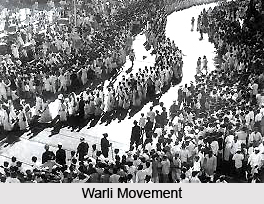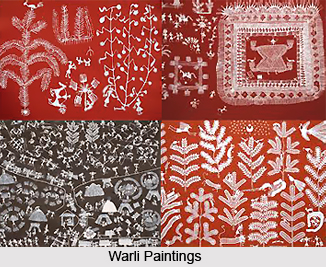 Warli movement was one among many peasant movements in which the women of India participated. In the post-war period there were a number of educated young women who had joined peasant movements. They had gone to jail for their political activity during the Quit India Movement and this had radicalized the women of the generation. When they joined these peasant movements they were fighting for an India that promised social and economic justice for men and women and rich and poor. It was a revolutionary vision that was looking for a change that was far beyond the one contemplated by either the Indian National Congress or the women`s organizations.
Warli movement was one among many peasant movements in which the women of India participated. In the post-war period there were a number of educated young women who had joined peasant movements. They had gone to jail for their political activity during the Quit India Movement and this had radicalized the women of the generation. When they joined these peasant movements they were fighting for an India that promised social and economic justice for men and women and rich and poor. It was a revolutionary vision that was looking for a change that was far beyond the one contemplated by either the Indian National Congress or the women`s organizations.
Origin of the Warli Movement
The primitive Warlis were adivasis (sometimes referred to as tribal or aboriginal peoples) in western India. They had once owned much of the land in Thana District, about sixty miles from Mumbai. Under colonial rule, speculators from all over India came into the region and seized their land. These outsiders became powerful landlords and the Warlis became their captive labour force. The Warlis were now allocated land as sharecroppers and required to pay the landlords one-third to one-half of their harvest as rent. Moreover, they were required to work without remuneration.
After attending a Kisan (peasant) conference in 1945 Warli leaders were inspired to take up a red flag and defy their landlords. The landlords counter-attacked, badly beating the Warlis. When the Maharashtra Kisan Sabha (Maharashtran Peasants` Association) heard about the battle they sent Godavari Parulekar as their representative to live with the Warlis and deal with the problem.
 Warli Movement under Godavan Parulekar
Warli Movement under Godavan Parulekar
Godavan Parulekar worked among the Warlis, between 1945 and 1947 to help them obtain social and economic justice. The daughter of a Pune advocate, Godavan Gokhale received an excellent formal education and was encouraged by her father to think and act independently. After studying law, she passed the bar exam and then requested admission to the Servants of India Society. She became friends with young Communists while she was working among women in Mumbai tenements. It was at this time she met and married the labour leader Shamrao Parulekar. During the war years she was frequently arrested, detained, and imprisoned for her work with labour unions. At the conclusion of the war she joined the Warli peasants as they struggled to escape their status as bonded labour.
It soon became clear to Godavari that the Warli women were even more severely oppressed in the struggle. Often the victims of rape and assault by by landlords, Warli women were considered less pure than Warli men. They were frequently accused of witchcraft and killed. Godavari understood the nature and seriousness of female oppression but could do little about it.
Her first concern was imparting a basic political education to a people engaged in revolutionary struggle. During the time Godavari was allied with the Warlis they suffered vicious attacks from both the police and army. In 1946 she was forbidden to enter the Warli areas but continued to do so in secret. She stayed in hiding for nearly three years but was caught in 1950 and spent the next three years in prison. Finally the Warlis won the right to be paid for their work and some of the worst forms of exploitation were abolished.
Godavari Parulekar had always worked for women`s rights and economic justice at the same time. In Mumbai her efforts on behalf of both causes, for example, the literacy campaign, encouraging labour unions, the domestic workers` union, and sewing classes, were significant. However, when she worked with the Warlis, she was unable to focus on the specific problems of women. Warli women gained the same freedom as their men but this movement had done nothing to liberate them from the gender oppression endemic to their society.



















